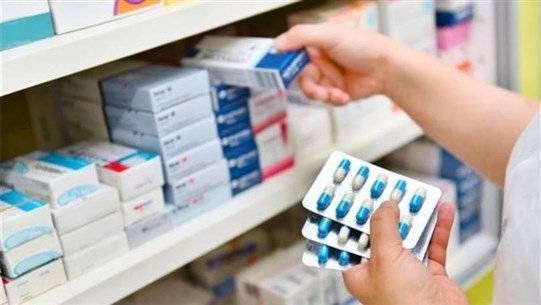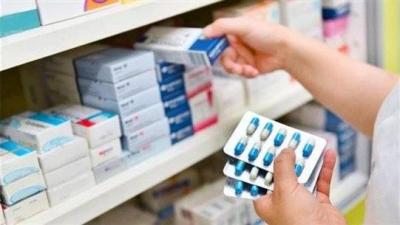It is not difficult for users of social media to come across pages or groups with bold titles and phrases such as "Delivering all Turkish medicines to Lebanon within days," "Subsidized medicine from Turkey to Lebanon," and "Your order of Turkish medicine is here." At first glance, patients or their families, eager for medication, read these ads and breathe a sigh of relief. But what are these medications, and at what cost? Beware... some of these drugs may be more harmful to the patient than the lack of treatment itself.
We contacted a number of the phone numbers scattered in the ads found here and there, and we were greeted as potential "customers." However, when we attempted to ask probing questions, we received a unified response: "Don't bother yourself; no one can tell you how the medicine is produced." This might be a logical answer regarding a definition of "illicit" trade. However, one individual formed an exception before he changed the subject, revealing a little: "There are no counterfeit medicines in Turkey because the supervision over pharmacies is very strict there... If there's any counterfeiting, it would be here in Lebanon because there's no trust in the state at all... Outside Turkish pharmacies, of course, there are counterfeit and non-compliant medicines sold in the black market... Each person has their own conscience and credibility." When we inquired about how such quantities of medicine are brought through the airport, he replied: "The state is allowing it and turning a blind eye."
Exactly. Although there are no precise figures on the value of medicines entering Lebanon outside of legitimate channels (especially from Turkey, Syria, and Egypt), it is estimated to reach around thirty million dollars annually, according to the International Information Center. A legal source, who preferred not to be named, informed us that there are also pharmacies shipping Turkish medicine outside the framework of agents, which is considered a legal violation. He stated that "this phenomenon began as a personal service and later turned into organized trade. 'Mazen' pharmacy was one of the first pharmacies to start importing its own shipments from Turkey. Note that the owner owns a private airline called 'Basateel Al-Rih' which he bought for one dollar after it was burdened with debts amounting to 30 million dollars, which facilitated the shipping of the medicine." Regarding the airport, the medicines pass, according to the source, under the pretext of "personal use" and not commercial. He pointed out a clear collusion between "Pharaohs" within the Ministry of Health and entities shipping the medicine openly, likening the drug mafia to the flour, gasoline, and many other vital commodities mafia.
**Repeating Suffering**
"It was the night before my first treatment session when I received a call from the hospital administration asking me to secure the medicine from outside Lebanon due to their inability to provide it." This is what Reema (a pseudonym), a cancer patient, tells us, adding: "During my treatment, I did not shed a tear until that night when I realized that securing the medicine would be tougher than the treatment itself." Faced with either being untreated or resorting to Turkish medicine, which she is well aware may be counterfeit, in a country where supervision is on the verge of extinction, Reema found no option but to turn to the black market: "The trade of Turkish medicines in the black market is very active, most of it is unfit for consumption and expensive. I had to buy a Turkish-made substitute for my treatment for 200 dollars per box, while it was being sold subsidized for 150 thousand Lebanese pounds." But what is even stranger is that after Reema verified the reason for the medicine shortage, she was informed that the Ministry of Health had prohibited the importing company from importing it: "The ministry here neither shows mercy nor allows God's mercy to descend," she complains bitterly.
Reema can afford to buy the medicine monthly, but what about those who cannot afford it, and the costs of their medications could be multiplied? How can patients or their families verify the validity of what they are purchasing? Where is media awareness amid the limited role of the Ministry of Health in tracking foreign medicine in general and Turkish medicine in particular? Is there anyone protecting what is said about Lebanese-Turkish mafias being linked to the matter or, at least, turning a blind eye to its activity? Many Lebanese confirm that they could not purchase immune treatments from Turkish pharmacies due to their inability to provide a Turkish prescription. So how and who can buy those medicines without prescriptions and send them to Lebanon upon request, one wonders?
**The Lesser of Two Evils**
We initially wish to hear the opinions of the Minister of Health and the President of the Physicians' Syndicate, but neither party expressed a desire to comment. However, if we must survey pure medical opinion, we contacted hematology and oncology specialist, Professor Fadi Nasr, who clarified in a conversation with "Nidaa al-Watan" that the core issue is the medicine shortage, forcing people to resort to Turkish medicine or other alternatives, without denying the existence of good medicine and another that is faulty. But how can patients distinguish between the two? "Neither the patient nor the doctor can do that. All we do when the patient arrives at the hospital for treatment is to communicate with the manufacturing company to verify the validity of the medicine box in their possession. Unfortunately, there are continuously many cases of faulty medicines, especially those related to immune therapy."
We know that death is an inevitable fate. However, for a patient to die as a result of one of two evils - a lack of treatment or taking faulty medicine - is a tragedy before our eyes. "Yes, the tragedy is huge, and there are many cases of patients dying without a response." When we ask about the role of the Ministry of Health, Nasr points to the efforts being made to provide subsidized medicine from the agent to the hospital directly without going through a third party: "The problem is that when the medicine arrives, even via the Ministry of Health, theft and favoritism commence," Nasr says, hoping that this plan's implementation begins this month as it addresses a significant part of the dilemma, insisting that a political solution is crucial and that matters will not be resolved without finding it.
**Exceptional Cases**
Pharmacy Syndicate President, Joe Salloum, also indicated in a call with "Nidaa Al-Watan" that the only way to stop the ongoing chaos in the medicine market is to secure it through legitimate and legal frameworks and via the technical committee in the Ministry of Health. According to Salloum, "This way, we can provide the best solution for the patient resorting to the black market, whether the medicine is Turkish or otherwise, due to its unavailability in Lebanon." On the other hand, Salloum explains that medicines entering Lebanese territory must first be registered with the Ministry of Health and meet the standards and specifications set by the technical committee. Therefore, any medicine entering unlawfully or becoming available through "suitcase traders" or online does not fall under this supervision. It is no wonder that the chances of counterfeiting or manipulating the expiration date or even storing them incorrectly, disregarding the required temperature and humidity, increase. As for the price, there is no deterrent for it to become several times its normal rate since it is subject to the game of supply and demand.
But what about pharmacies securing medicine from abroad? "This is an exceptional and illegal case witnessed in the country. Some pharmacies have received special permission from the Ministry of Health to import medicines from abroad, but we emphasize that this is an exceptional case. The normal process is to secure medicines from the manufacturer to the pharmacy, and from the pharmacy, the medicine is dispensed," Salloum responds.
What is the solution and the fate of hundreds, or perhaps thousands of patients, hanging in the balance? From Salloum's perspective, "The solution lies in the drug card that I proposed eight months ago, which began working on today. The tracking system for cancer medicines is the first cornerstone of this drug card." We will return later to the drug card, but until it is activated, the President of the Pharmacists' Syndicate advises Lebanese patients to personally - or through one of their relatives or acquaintances - go abroad, whenever possible, to buy the medicine directly from the pharmacy. He continued, praising the quality of Lebanese-made medicines which have become internationally recognized and cover over 30% of the local market's chronic medicine needs, hoping to reach a stage of self-sufficiency concerning other medicines.
**Awaiting the Drug Card**
Returning to the drug card that Salloum launched a funding campaign for last December, it is considered a pressing need amid the loss of medicine and the monopolization of it and the spiraling of its prices, especially after the complete lifting of subsidies on chronic disease medications. This card is supposed to allow every patient to secure medicine without money being an obstacle to obtaining treatment, as a monthly amount will be allocated to the card allowing its use to purchase medicines from all pharmacies.
According to Salloum, the drug card is based on two pillars: first, tracking the medicine from its arrival from abroad to the pharmacy through the importer until it is received by the patient, eliminating attempts at counterfeiting and improper storage and ensuring delivery to the right patient; the second is ensuring pharmaceutical freedom for every patient so that their needs are known, which allows for a budget to be determined based on which assistance or grants can be requested from abroad, thus direct support reaches the patient. "As long as the support is for the product, smuggling abroad will remain active," Salloum stresses.
It is worth noting that the Ministry of Health is currently cooperating with the Pharmacists' Syndicate regarding the trial of the tracking system on around 10 cancer treatment medicines, with the intention of generalizing this system to all pharmacies in the coming months. The coming days will see training for more than a hundred pharmacists, to be followed by other medicines, focusing initially on the high-cost cancer treatments.
Until then, one activist monitoring and following up on various corruption files summarized the issue for us, stating that the absence of an effective role by the state, its agencies, and the judiciary has turned "the activation of public discipline" into a forgotten matter and replaced it with various forms of chaos across various sectors. There is nothing more to add...




